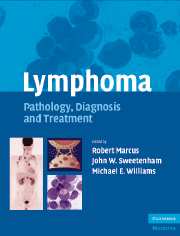6 - Therapeutic immunology
from Part I - LYMPHOMA OVERVIEW
Published online by Cambridge University Press: 05 March 2010
Summary
INTRODUCTION
There has been significant progress in developing immunotherapeutics for non-Hodgkin's lymphoma (NHL). The first monoclonal antibodies for treatment of cancer were approved for the non-Hodgkin's lymphoma indication in 1997. This has led to a burst of development and expansion of various forms of passive immunotherapy, targeted therapy and active immunization. In fact a whole new paradigm of cancer management is evolving based upon these seminal observations and advances. This chapter will review important principles of both active and passive immunotherapy, focusing mainly on non-Hodgkin's lymphoma.
TUMOR ANTIGENS
Tumor antigens are of fundamental importance to both passive and active immunotherapy strategies. The existence of tumor antigens enables immunotherapeutic approaches to be specific to the tumor and ideally not directed to normal cells. The favorable toxicity profile that results is one of the major attractions of immunotherapeutic approaches. Thus the tumor antigen will be an important factor in determining the specificity and the toxicity profile of the approach. The success of the immunotherapeutic strategy will depend to a large extent on the features of the tumor antigen target.
Features and types of tumor antigens
Whereas the innate immune system is not for the most part antigen-specific, the adaptive immune response mediated by B and T lymphocytes has a level of specificity built in and is directed towards antigenic targets. In the case of tumor immunology, these antigenic targets are termed “tumor antigens” (Table 6.1).
- Type
- Chapter
- Information
- Lymphoma: Pathology, Diagnosis and Treatment , pp. 68 - 86Publisher: Cambridge University PressPrint publication year: 2007



